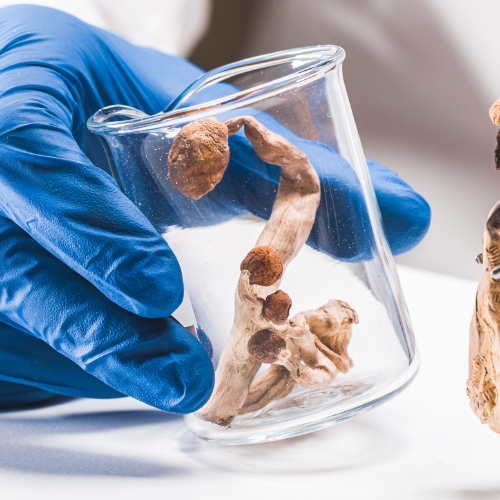Magic Mushrooms are currently not legal
Magic Mushrooms containing Psilocybin are currently a Class A drug in Schedule 1 restrictions.
Medical psychedelic research has undergone a renaissance in recent years. Psychedelics include plant medicines such as psilocybin (the active constituent of magic mushrooms), Ayahuasca (a powerful psychedelic used by indigenous populations, made from Banisteriopsis caapi vine, and often consumed as a tea), and those synthesised in the laboratory, including Lysergic acid diethylamide (LSD) and MDMA (ecstasy).
What do the ‘classes’ of controlled drugs refer to?
This is the grouping system used by the Misuse of Drugs Act to reflect how dangerous substance is.
Drugs are grouped into a ‘Class’ – either A, B or C according to their risk level, with Class A substances
the most dangerous.
Class A
Class A drugs include:
- Cocaine
- Crack cocaine
- Ecstasy (MDMA)
- Heroin
- LSD
- Magic mushrooms
- Methadone
- Methamphetamine (crystal meth)
What do the ‘schedules’ of controlled drugs refer to?
Drugs are divided into schedules, each specifying the requirements governing such activities as import, export, production, supply, possession, and record keeping which apply to them, for example in research-based circumstances.
They are are grouped into one of five ‘Schedules’ with Schedule 1 having the tightest controls.
Some drugs that are in Schedule 2 are potentially more dangerous than Magic Mushrooms.
For substances in Schedule 1, a Home Office licence is generally required for their production, possession, or supply. This involves an assessment of laboratories by Home Office staff, which is a time-consuming process that can take up to six months. This process has been further delayed by COVID-19, with the Home Office ceasing to carry out checks.
Current license holders have been able to continue using their existence licenses, but the application process for prospective researchers has become even more difficult.
A controlled drug register must be used to record details of any Schedule 1 controlled drugs received or supplied by a licensed supplier. The drug has to be destroyed after use, under supervision by a qualified person, e.g. specialist pharmacist.
Researchers seeking to work on potential new treatments for treatment resistant depression (TRD) using psilocybin have to pay £3,000 for a new licence.
Also delays (up to one year in some cases, due to its classification as a Schedule 1 substance.
This is in spite of existing evidence of its safety, medical benefit and its potential as the basis for new treatments for depression.
This delay and cost is compounded by the time taken for necessary ethical and Home Office processes to obtain a license to carry out research programme – typically at least 1 year for a new license, and 4-6 months to amend an existing license.
Scheduling is not merely a theoretical issue – it determines which research projects researchers choose to consider, which get approved, and how billions of pounds of R&D funds in the UK and international pharma industry are committed.
The status of psilocybin in Schedule 1 creates costly and time-consuming bureaucracy before research can even begin, restricting the potential of the UK’s smaller research institutions and pharmaceutical companies in contributing to this emerging area.
In order to enable this research in the UK, this Government needs to move psilocybin from Schedule 1 to Schedule 2 of the 1971 Misuse of Drugs Act.
There is no evidence to support psilocybin being in Schedule 1
Risk reviews have consistently shown that, provided participants are psychologically prepared and take drugs derived from psychedelics in a controlled setting, the effects can be significantly beneficial. Psychedelics have a low physiological risk when used outside of a clinical setting to users and society.
It is also notable that some of the substances in lower Schedules than psychedelics include heroin, cocaine, and ketamine – which are all managed responsibly by research staff. Schedule 1 is reserved for substances with no medical value – whereas psilocybin clearly has such value.
Science has moved on

There is now sufficient evidence of potential medical benefit for medicines derived from psychedelics. Moving psychedelics from Schedule 1 to a lower Schedule would enable our drug regulations to continue working in the way that they were intended – allowing medical and pharmaceutical research, and continuing to guarantee secure and responsible stewardship of substances in a small number of properly regulated organisations.
By rescheduling psilocybin to Schedule 2, many opportunities can be realised. There will be benefits, not just in the field of health and social care, but also research leadership, industrial, and financial rewards.
Psilocybin and other psychedelics are already being rescheduled in other countries
Many other countries – including the US – have relaxed controls on psilocybin to enable research. The FDA has also fast tracked MDMA for treatment of PTSD, and Psilocybin for severe depression. Psilocybin is derived from fungi native to the UK, which – combined with research expertise and funding – means there is huge potential for the UK to tap into a lucrative market.
To study Magic Mushrooms you can purchase SPORES to look at under a microscope.
Possession penalty
There is no penalty for carrying psychoactive substances.
Supply and production penalty
You can get up to 7 years in prison, an unlimited fine or both if you:
- Carry a psychoactive substance and you intend to supply it
- Make a psychoactive substance
- Sell, deal or share a psychoactive substance (also called supplying them)



